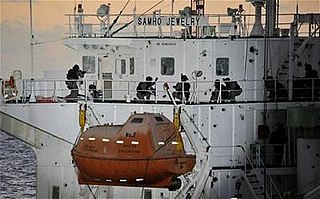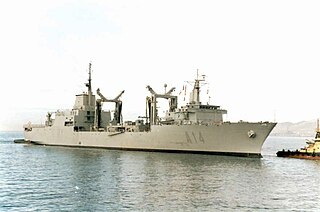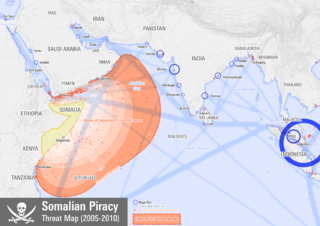
Victoria (F82) is the second of the six Spanish-built Santa Maria-class frigates, based on the American Oliver Hazard Perry class design, of the Spanish Navy.

Operation Enduring Freedom – Horn of Africa (OEF-HOA) is a component of Operation Enduring Freedom (OEF). The Combined Joint Task Force – Horn of Africa (CJTF-HOA) is the primary military component assigned to accomplish the objectives of the mission. The naval component is the multinational Combined Task Force 150 (CTF-150) which operates under the direction of the United States Fifth Fleet. Both of these organizations have been historically part of United States Central Command. In February 2007, United States President George W. Bush announced the establishment of the United States Africa Command which took over all of the area of operations of CJTF-HOA in October 2008.
Piracy off the coast of Somalia occurs in the Gulf of Aden, Guardafui Channel and Somali Sea, in Somali territorial waters and other surrounding areas. It was initially a threat to international fishing vessels, expanding to international shipping since the Consolidation of states within Somalia (1998–2006) of the Somali Civil War, around 2000.

Operation Atalanta, formally European Union Naval ForceSomalia, is a current counter-piracy military operation at sea off the Horn of Africa and in the Western Indian Ocean, that is the first naval operation conducted by the European Union (EU). The operational headquarters is currently located at the Spanish Operation Headquarters (ESOHQ) at Naval Station Rota in Spain, having moved from London as a result of the British withdrawal from the EU.

MV Tygra is a container ship previously owned by Maersk Line Limited and operated by Waterman Steamship Corporation, now owned by Element Shipmanagement SA of Piraeus.

The Maersk Alabamahijacking led to a series of maritime events that began on 8 April 2009, when four pirates in the Indian Ocean seized the cargo ship Maersk Alabama at a distance of 240 nautical miles southeast of Eyl, Somalia. The siege ended after a rescue effort by the United States Navy on 12 April.
The MV Almezaan is a general cargo vessel active off the Horn of Africa. Originally built as the Tarcau, she was renamed in November 2001. The name can be translated from Arabic as "the balance" or "the scales" as well as justice and equity.

The action of 23 March 2010 was an attack by Somali pirates on a Panamanian-flagged merchant vessel and the subsequent capture of the pirates by the Spanish Navy. The encounter happened off the coast of Somalia and ended with the death of one pirate and the capture of six others.

Operation Dawn of Gulf of Aden was a naval operation by the Republic of Korea Navy against Somali pirates in the Arabian Sea. The operation was spurred by the pirates' seizure of the South Korean chemical tanker Samho Jewelry. In response, the South Korean government sent a destroyer and 30 naval commandos to retake the ship and rescue its crew. After trailing the tanker for several days and fighting a preliminary engagement that neutralized four of the pirates, the South Korean forces retook the ship by force on January 21, 2011 in a successful boarding action that resulted in the deaths of eight and the capture of five out of thirteen pirates.

Operation Ocean Shield was NATO's contribution to Operation Enduring Freedom – Horn of Africa (OEF-HOA), an anti-piracy initiative in the Indian Ocean, Guardafui Channel, Gulf of Aden and Arabian Sea. It follows the earlier Operation Allied Protector. Naval operations began on 17 August 2009 after being approved by the North Atlantic Council, the program was terminated on 15 December 2016 by NATO. Operation Ocean Shield focused on protecting the ships of Operation Allied Provider, which transported relief supplies as part of the World Food Programme's mission in the region. The initiative also helped strengthen the navies and coast guards of regional states to assist in countering pirate attacks. Additionally, China and South Korea sent warships to participate in these activities.

On 12 January 2012 Somali pirates attacked the Spanish Navy replenishment oiler Patiño after mistaking her for a large merchant ship. The pirate skiff hit Patiño with automatic fire before being repelled, damaged by return fire and captured after a brief chase by the vessel's helicopter. The encounter took place off the coast of Somalia and ended with the death of one pirate and the capture of six others.

The action of 7 September 2009 took place when the German frigate Brandenburg, taking part of Operation Atalanta, chased and captured a pirate skiff south of Mukalla, in the Gulf of Aden, after suspicious activity was spotted on the small vessel by the frigate's helicopter during a reconnaissance mission. The boat was disabled by gunfire, and one suspect from her crew was killed. Four individuals were captured and weaponry confiscated and eventually destroyed.
The following lists events that happened in 2009 in Somalia.

Piracy in Somalia has been a threat to international shipping since the beginning of the country's civil war in the early 1990s. Since 2005, many international organizations have expressed concern over the rise in acts of piracy. Piracy impeded the delivery of shipments and increased shipping expenses, costing an estimated $6.6 to $6.9 billion a year in global trade in 2011 according to Oceans Beyond Piracy (OBP). According to the German Institute for Economic Research (DIW), a veritable industry of profiteers also arose around the piracy. Insurance companies significantly increased their profits from the pirate attacks, as the firms hiked rate premiums in response. Since 2013, piracy attacks have reduced in the region due mostly to patrolling by the navies of countries across the world, especially India, China and EU Navfor Operation Atalanta.










